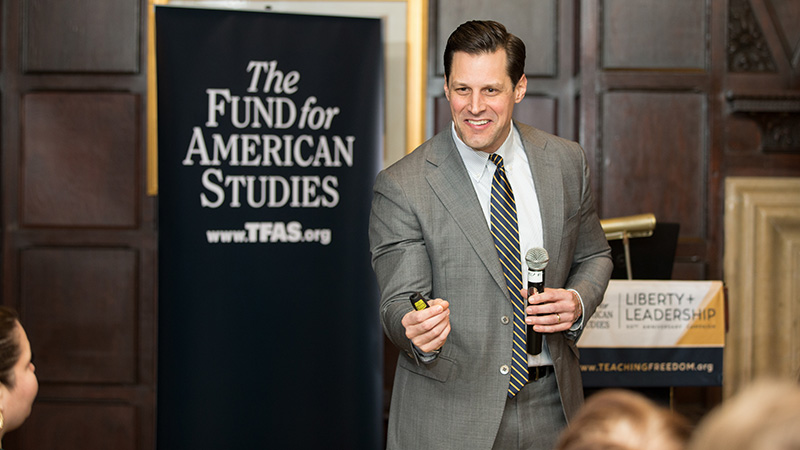
As support for socialism continues to rise and free markets come under attack, TFAS alumni gathered in New York for an engaging discussion on how human and data-driven stories can help liberty win the battle of ideas.
As a journalist in New York City, the lectures on economics and social development, informed my day to day work … Any TFAS event is like a ‘mental spa.’ You leave feeling mentally refreshed and inspired.” – Wesley Parnell ’17, ’18
Professor Brian Brenberg of The King’s College and TFAS Senior Scholar Dr. Donald J. Boudreaux of George Mason University headlined the inaugural “Liberty + the Future” lecture at the Harvard Club in New York City on Jan. 23.
CAPTURING THE MORAL IMAGINATION
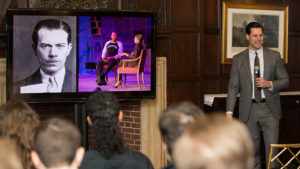
Professor Brian Brenberg argued that young people are not attracted to socialism because they are hearing compelling economic arguments, but rather because supporters of socialism are very good at creating and disseminating stories that cast capitalists in the role of the bad guy.
“The battle we’re in between socialism and capitalism is not being fought over economic arguments,” said Brenberg. “The contested territory is actually the moral imagination of our culture.”
But, capitalism doesn’t have to lose the battle of stories and American’s hearts said Brenberg. Rather than focusing on the mathematic and economic issues of the socialism narrative, he said our response to these stories should be stories of our own that tell the businesses and innovations that make the world a better place.
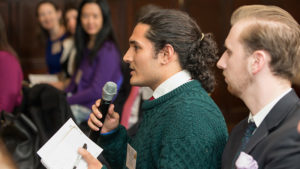
“Capitalism is full of amazing stories, it generates amazing stories of problems solved, of human flourishing, of opportunity created, of lives extended – it’s all over the place,” said Brenberg.
The real problem, he said, is not the lack of stories, but a lack of storytellers who can recognize the wonders and heroes of capitalism. “Free enterprise has so many heroes – and their effects are so pervasive – that they very quickly become very mundane to our eyes.”
As an example, Brenberg shared the story of Earl Bakken, the founder of Medtronic and the inventor of the first wearable, battery-powered pacemaker. After inventing the machine in his Minnesota garage in the 1950s, Bakken grew his company into a multi-billion-dollar business and served tens of thousands of people through his medical advances, including Brenberg’s father who had a pacemaker implanted several years ago.
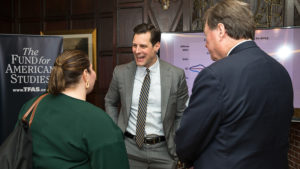
“How can Earl Bakken’s story shape your moral imagination about capitalism when you’ve never even heard it?” asked Brenberg. “We should be telling his story and thousands of stories like it all of the time … if you don’t, those stories recede into the background, and new stories never get written – that’s the threat.”
Brenberg concluded his talk by challenging TFAS alumni to stand on the frontlines of the battle.
“You are in the position to change the stories we tell and change the moral imagination,” he said. “There’s a story to be told. You’re in a position to tell it. So, what are you going to do about it?”
Brenberg is executive vice president, chair of the program in business and finance, and associate professor of business and economics at The King’s College (TKC) in New York City. His work focuses on economic freedom as a driver of prosperity and human flourishing; and entrepreneurship as an expression of creativity.
DEBUNKING FEARS OF FREE TRADE
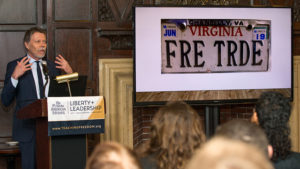
Economist Dr. Donald J. Boudreaux shared his passion for trade and presented how data-driven storytelling can combat the false narrative of the “evils” of globalization and tell the positive impact of free markets.
“I feel very passionate about trade and I want people to understand trade and to accept why free trade is both an ethical and economically sound decision, the best decision,” he said.
A common story that Boudreaux said can be debunked through a data-driven narrative is the misconception that free trade and imports cost American jobs.
“When you look at the whole story – economists say there is no reason to think that trade destroys jobs, even though that story is constantly told by protectionists on the left and right,” he said.
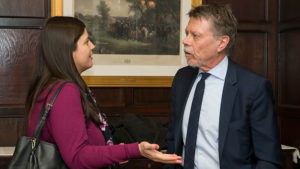
Citing data from the U.S. Bureaus of Labor Statistics (BLS), Economic Analysis (BEA) and the Federal Reserve Economic Data (FRED), Boudreaux showed attendees that a significant increase in the rate of imports in the late 70s had no effect of the number of jobs in the U.S. Likewise, data from the same sources show that the U.S. trade deficit has had no adverse effect on the number of jobs or on workers’ compensation in the U.S., despite the stories we hear in the press or from politicians to the contrary.
“This notion that the more we import, the more jobs we lose is simply mistaken. You can’t find it in the data,” said Boudreaux.
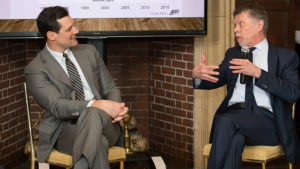
He said the story the data does show and we should be sharing is that other countries believe in the United States and want to invest in us. “Why should we be upset when the trade deficit rises? All that means is that foreigners want to invest more in America,” said Boudreaux. “We shouldn’t be upset about that, we should be proud of that fact.”
Dr. Boudreaux is is a professor of economics at George Mason University (GMU) and a senior fellow with the F.A. Hayek Program at GMU’s Mercatus Center. He is a senior scholar at The Fund for American Studies (TFAS) and teaches Economics for the Citizen for TFAS D.C. Summer Programs.
ENGAGING THE TFAS ALUMNI NETWORK
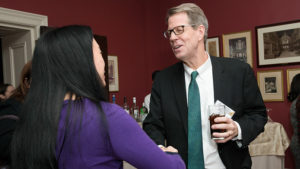
The lecture was followed by a reception, allowing attendees to continue the discussion and network with fellow alumni peer leaders in the New York area. Attendees included alumni from the inaugural TFAS class of 1970 all the way through to the most recent class of 2019.
Alumnus Wesley Parnell ’17, ’18 – a reporter and photographer at the New York Daily News – said the event engaged important and complex ideas in a setting that was accessible and lent itself to conversation and networking.
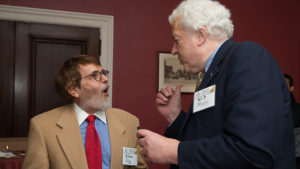
“The lectures were engaging and crossed disciplinary lines,” said Parnell. “As a journalist in New York City, the lectures on economics and social development, informed my day to day work … Any TFAS event is like a ‘mental spa.’ You leave feeling mentally refreshed and inspired.”
The “Liberty + the Future: NYC Alumni Lecture Series” is an exclusive opportunity for TFAS alumni in the New York area to think critically about the ideas and issues that impact a free society while connecting with fellow alumni leaders who are passionate about creating a brighter and more prosperous future.
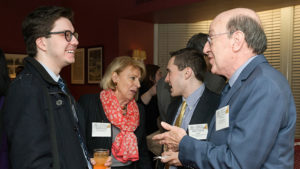
Each quarterly event features two liberty thought leaders to speak on issues related to free enterprise, economic and political liberty, limited government and individual responsibility.
The next lecture is scheduled for April 23 at the Harvard Club in New York. To learn more about the series and how you can register for future events, visit TFAS.org/NYCALS.
The series is made possible through the generosity of the Achelis and Bodman Foundation. Their gift, made in support of our 50th Anniversary Liberty + Leadership Campaign initiative to engage and mobilize the global TFAS alumni network, allows alumni leaders to continue their education in liberty.
View more photos from the TFAS “Liberty + the Future” NYC Alumni Lecture on Facebook.

